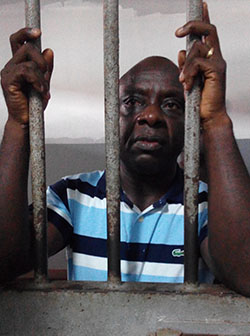Abidjan, August 5, 2015–A journalist who was imprisoned for almost a week by authorities in the Ivory Coast has been charged with defamation, among other crimes, according to the journalist and news reports. The Committee to Protect Journalists calls on authorities in the Ivory Coast to drop the charges against Joseph Titi immediately.
A judge in the capital, Abidjan, charged Titi on Monday with defamation, insulting the president and a foreign head of state, and publishing false information, Titi told CPJ. The journalist was detained on July 29 and was released on Tuesday after being charged. Titi said he was released from prison because the charges fall under the country’s Press Law, which excludes imprisonment for the offenses. If convicted, Titi faces a fine of between 10,000,000 and 20,000,000 CFA francs (US$17,000-US$34,000) under the law.
The charges against Titi, the publisher of the privately owned daily Aujourd’hui, stem from an article published in the July 21 edition of the paper. The article, which was written under Titi’s penname Sévérine Blé, alleged the involvement of President Alassane Ouattara in illicit funds transfers, money laundering, and embezzling funds from the International Monetary Fund-World Bank’s Heavily Indebted Poor Countries initiative, Titi told CPJ. The article cited classified documents that allegedly originated from France’s defense and spy intelligence agency, the General Directorate for External Security (DGSE).
Titi said he was questioned about the article for five hours the day before he was arrested. He denied the charges against him and told CPJ he stood by the story.
CPJ called Ebenezer Viwami, an aide to Information Minister Affoussiata Bamba-Lamine, to request comment about the journalist’s case and about the allegations in the article. Viwami asked for the questions to be sent by email. CPJ has not yet received a response to the emailed questions. Masséré Touré, a spokesman for the president, did not return CPJ’s phone calls and text messages.
Local journalists, human rights defenders, and lawyers told CPJ they believe the charges against Titi are politically motivated and stem from a series of articles he published in July, including the July 21 story. The articles, all of which cite classified documents allegedly from the DGSE, accuse Ouattara of complicity in planning to rig the October 2015 elections, recruiting mercenaries, and purchasing arms in violation of a United Nations arms embargo. The articles also mentioned alleged plans by France to oust Ouattara from power, according to CPJ’s review of the articles. This week, Aujourd’hui began re-publishing the stories.
“The actions Ivory Coast authorities have taken against Joseph Titi smack of harassment and attempted intimidation in response to his paper’s serious allegations against President Alassane Ouattara ahead of the country’s elections,” said CPJ’s West Africa representative, Peter Nkanga. “We call on the government to drop all charges against Titi and to allow journalists to report on issues of public interest without fear of reprisal.”
Titi told CPJ today that he had been summoned before the state-run National Press Council, which has the ability to censure journalists for press offenses. Raphael Lakpe, the president of the council, told CPJ today the council would now handle Titi’s case.
The French government has not publicly denied, confirmed, or condemned the information published in Aujourd’hui‘s articles, according to news reports. None of the other authorities cited in the stories have done so either.
- For data and analysis on the Ivory Coast, visit CPJ’s Ivory Coast page.
